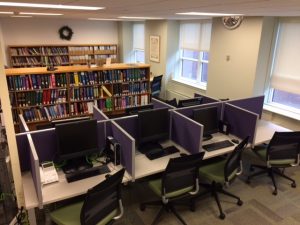Jan
11

Posted by Margot M on January 11th, 2019
Posted in: Communities of Interest
Tags: hospital librarians, nursing education, nursing research
Last fall, I asked several New England hospital librarians to share their stories about supporting nursing education and research. My first interview was with Mary Shah, MLS, AHIP. She is a Medical Librarian and Archivist at Danbury Hospital in Connecticut. This interview is with Maureen Dunn, MLIS, AHIP. Maureen is the Library Director at Concord Hospital in New Hampshire.
 Tell us how your library supports nursing education and/or research.
Tell us how your library supports nursing education and/or research.When I first arrived at Concord Hospital in 2002, my library was a traditional “doctors’ library” and nurses were hesitant to set foot in the door. One of the first things I did was ask for 10 minutes at the Nurse Educator meeting, and told them the door was open, and I had chocolate on my desk – come on in! It didn’t take long for word to spread, and to this day, the nurse educators, and the unit-based practice committees they oversee, are among my best research customers.
I’ve also participated on nursing policy committees, patient education committees, the interdisciplinary Clinical Practice Council, the approval board for RN4s in our clinical ladder program and, most recently, the Evidence Based Practice committee. Along with those more formal groups, I’ve advertised the library as being a resource for nurses going back to school. We’ve had a big organizational push over the last 5 years to encourage nurses to achieve their BSNs, not to mention the many nurses who have decided to return to school for an MSN (and a handful of DNPs). The library intranet site has a page dedicated to students, and I participate in an unofficial Concord Hospital Facebook “back to school” support group, where I’ve been able to field research and database questions after hours.
Finally, in partnership with a nurse and our residency’s scholarly activity coordinator, we created a course called Scholarly Activity 101 that aims to help staff wanting to get involved with research or taking their existing QI projects to another level and presenting their activities at a conference or publishing. We’ve had great interest from nurses, who have a lot to say!
Nurses appreciate having input into the resources the library gets. We actually switched drug reference databases a number of years ago due in great part to the fact that nurses found the old one difficult to use at the bedside. It took a while, and buy-in from the pharmacy, but a switch to a database with a friendlier interface was achieved. We’ve just started a collaborative process of evaluating nursing-specific resources in the hope of making the job of the educators less labor intensive and giving bedside nurses more resources for quick reference. There’s a great deal of excitement around the possibilities there.
I find that the library and nursing have a very symbiotic relationship in this regard. The library’s impacts on patient care, safety, and quality are remote, while nursing’s are immediate, but nurses know they can rely on the library to get them the information they need to provide that quality care, and in return they are incredibly supportive of the library and provide a great deal of word of mouth advertising that reflects the positive impact of the library.
If you’re looking to increase services to nursing, talk to nurse managers about staff going back to school. Many nurses who haven’t been in school for a while are overwhelmed by things like navigating databases and citing sources properly. Also, I can honestly say that no one has ever turned me down when I’ve offered to present at a meeting. Getting in front of nursing leadership and telling them you can save them time with their policy updates or clinical questions never fails to win friends. Nursing friends are among the best friends a library can have.
Contact for Maureen Dunn: mpdunn@crhc.org
On Thu, March 28, NNLM NER will host a webinar on Librarians Supporting Nursing Scholarship. This session will feature Alice Stokes (Dana Medical Library, University of Vermont), Lisa Marks and Diane Almader-Douglas (Mayo Clinic Libraries, Phoenix AZ). During this webinar, they will talk with us about their learned experiences in working with nurses.